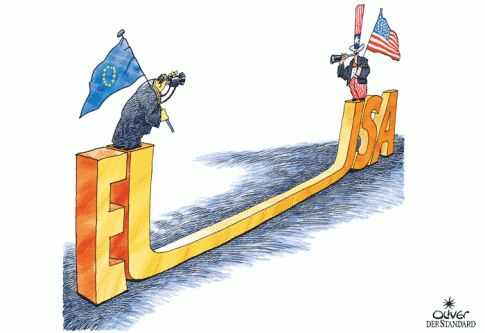
Public Service Europe | 11 July 2013
The major obstacles to the EU-US free trade deal
by Maya Rostowska
Topics such as public procurement, data protection, financial services, agricultural issues, geographical indicators and sanitary and phytosanitary measures will prove the most problematic during talks – suggests think-tank
The first round of negotiations in the European Union-United States trade deal – the Transatlantic Trade and Investment Partnership or ’TTIP’ – has started. The talks taking place in Washington this week will be coloured by internal debates between politicians, stakeholders and civil society organisations on both sides of the Atlantic. In the EU, now that France has attained its desired audio-visual carve-out other member states can be expected to raise their own concerns.
Early indications suggest two key sticking points. The first is data privacy: MEPs of various political persuasions have said that revelations about US surveillance have strengthened their determination to maintain Europe’s tougher data protection standards. The second is agriculture: the European Commission’s mandate envisages safeguarding domestic industries threatened by a rise in imports, suggesting that some member states have already raised the issue at the European Council.
In America, there were signs of bipartisan accord regarding the benefits of TTIP from the start — with both Republican and Democratic representatives declaring their support for the agreement. This unanimity is due to the general consensus that TTIP will boost the American economy. Some politicians also see it as an opportunity to reassure their European partners given the perceived US ’pivot to Asia’ in recent years.
Although there is some resistance to TTIP among left-leaning Democrats due to an almost ideological opposition to free trade agreements, ultimately the stance of many US politicians will largely depend on the position taken by lobbyists from the most powerful stakeholders in their home states. And a majority of these – representing sectors ranging from airlines, through makers of distilled spirits, to fisheries – support a comprehensive agreement.
Most American stakeholders have offensive interests in TTIP. Many want the agreement to alter the EU’s sanitary and phytosanitary rules to American-style ’science-based’ regulations. Others want to see the issue of geographical indicators settled in their favour. Financial sector lobbyists are more inclusionary than the federal negotiators, who argue the industry should be excluded from TTIP for fear its inclusion will stall reform.
The only significant defensive stance of US stakeholders concerns public procurement laws. The ’buy American’ act, which requires state organs to prefer US-made goods and services, is a particular concern. Although US civil society associations are less enthusiastic about TTIP, they have much less influence on Congress and the negotiation process than the business groups that support a comprehensive TTIP.
European business broadly sees TTIP as an opportunity to expand. Many hope to gain access to the US public procurement market, through the lifting of provisions like ’buy American’. The European financial services industry wants its sector to be included in the deal. On the other hand, civil society groups fear TTIP is a ploy for deregulation. They want Europe to keep its precautionary principle and demand that talks not be held in secret – a sensitive issue in the EU since the Anti-Counterfeiting Trade Agreement was scrapped amid mass protests in 2011.
Topics where EU and US politicians and stakeholders’ interests clash — such as public procurement, data protection, financial services and agricultural issues like geographical indicators and sanitary and phytosanitary measures – will prove the most problematic during talks. But negotiations may yet succeed if both sides display goodwill, like that shown by the Motion Picture Association of America — which in an open letter to the US trade representative accepted EU support for domestic audio-visual industries. European member states and stakeholders that wish to see an ambitious TTIP should similarly avoid adopting a defensive negotiating strategy and focus on the bigger picture of the economic benefits that the agreement can bring.
Maya Rostowska is a research analyst at the Polish Institute of International Affairs think-tank